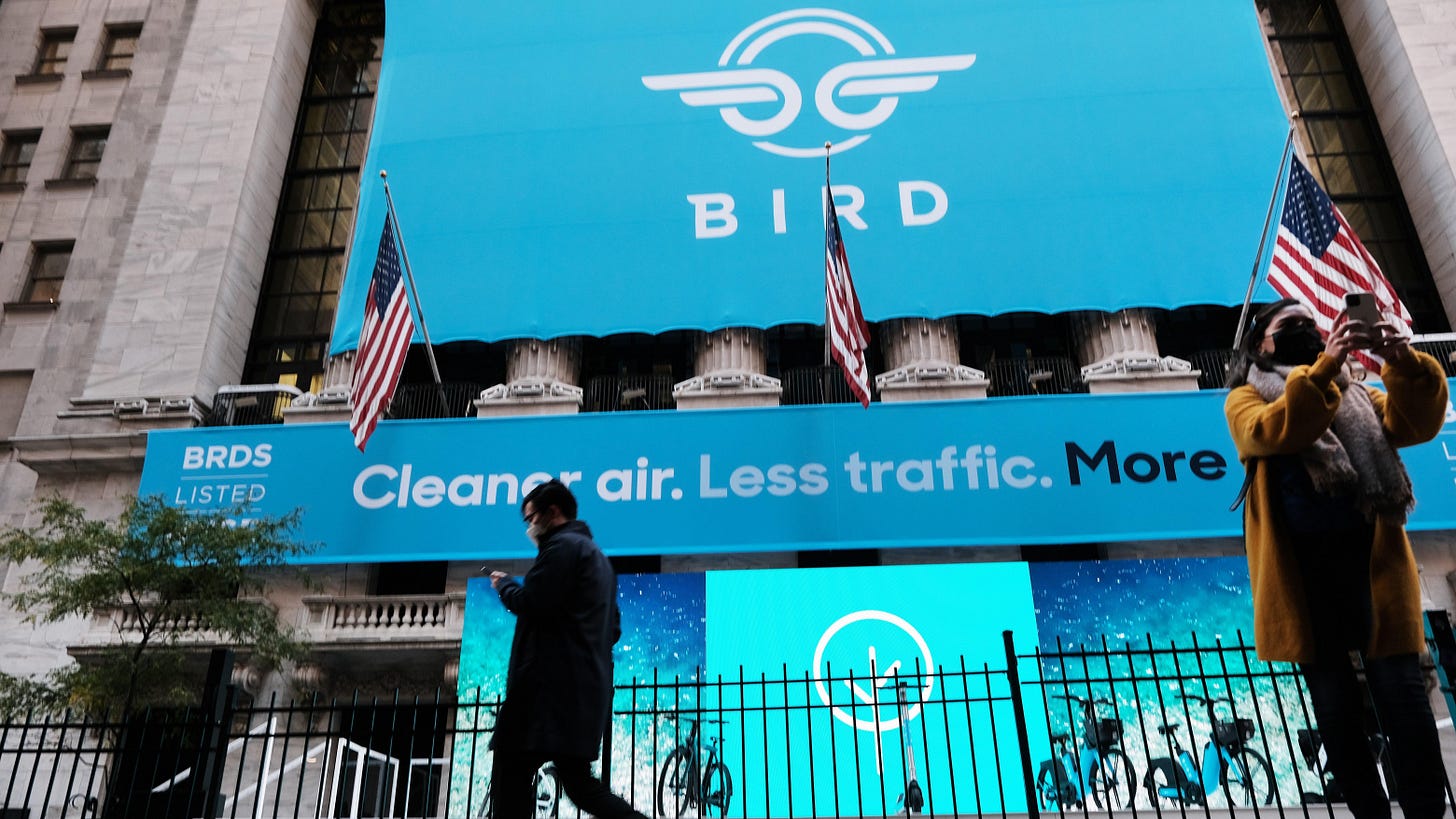How real is the danger of EV fire following Ian and Nicole flooding?
While some EVs have caught fire, no reports of e-scooters have emerged. How real is the danger? Also, the dueling futures of Bird and Helbiz as their numbers don't look good.
Bird & Helbiz on the financial ropes?
After announcing that it was pulling out of several markets across the US and world, Bird announced in filings with the US Securities and Exchange Commission that it has overestimated its revenues for more than two years. The overestimate apparently involved recognizing unpaid customer rides.
According to the filing, as reported by Techcrunch:
Accordingly, the Company plans to continue to closely monitor its operating forecast, reduce its operating expenses, and pursue additional sources of outside capital. Along with this global footprint realignment, the Company is targeting additional reductions in its operating expenses.
As I previously covered, Bird currently operates out of Tampa, Bradenton, Miami, and Orlando, as well as on the campus at the University of Miami in Coral Gables. Still no word if any of the Florida markets are on the cutting board.
Apparently, as reported by Techcrunch, Bird “recorded revenue on certain trips even when customers lacked sufficient ‘preloaded wallet balances,’ which Ben Lu, Bird’s chief financial officer, attributed to the company’s IT systems not capturing some failed payments after the completion of a ride."
Meanwhile, Helbiz’s third-quarter earnings report wasn’t that promising either. Both Helbiz and Bird are the only publicly traded companies. As Techcrunch noted, the largest amount in the loss of revenue for Helbiz came from its mobility department while its streaming performed well: “Shared scooter and bike rides only brought in $2.5 million in revenue this quarter, compared to $3.9 million in Q3 2021. Helbiz’s media division, a sports streaming platform, brought in more revenue this year than last at $1.1 million, up from $760,000 last year.”
Going down a different track than Bird, Helbiz announced that it believes expanding markets is key to its success. One example is the October acquisition of Wheels, a micromobility operator that employs a seated scooter. Wheels will be entering the Miami market utilizing a long-term rental option with a subscription cost of $129.99/month.
Dangers of batteries on e-bikes/e-scooters
As reports of fires in New York from the lithium-ion batteries of e-bikes and e-scooters spreads through the news, Florida is having it’s own concerns. After flooding from Hurricanes Ian and Nicole, Florida Chief Financial Officer Jimmy Patronis urged owners of e-scooters, golf carts, electric vehicles, and even power tools to be on alert for fires caused by saltwater intrusion in the batteries.
According to PropertyCasualty360, “Lithium-ion batteries that have been submerged in salt water are susceptible to ‘thermal runaway,’ which describes a process that is accelerated by an increase in temperature, resulting in the release of energy that then further increases the temperature. These fires also have the potential to ignite and reignite weeks after an event occurred.”

According to the Florida Office of Insurance Regulation, eight fires have been linked to batteries in electric vehicles following Hurricane Ian. USA Today reports that as of October 26, there have been 11 cases of EV fires following the flooding from Ian. No deaths have been reported. According to USA Today, Florida has the second-highest number of EVs after California.
"This is really the first time we had flooding in an area with a lot of electric cars," said Jon Linkov, deputy auto editor for Consumer Reports, to the USA Today.
As CFO Patronis said in a press release:
These EV fires are uniquely dangerous because, unlike a combustion engine, the fire will keep reigniting. Moreover, it’s especially dangerous if there’s an EV, golf cart or scooter in a storm-ravaged home. The battery system can become compromised, prompting a fire, which is again, something we really don’t experience with combustion engines.
But according to Haresh Kamath of the Electric Power Research Institute EV batteries are specifically engineered to make thermal runaway "very, very rare,” in that the “safety systems inside a lithium-ion battery generally prevent that type of thing happening unless there is some significant physical damage to that battery."
Why the focus on e-scooters but none on automakers?
Forbes Senior Contributor Carlton Reid asks what everyone around the world (at least those pro-MiMo) has on their mind: Why are slow rental e-scooters speed-regulated in cities but fast motor cars are not?
Car companies know, to coin a phrase, they can get away with murder, but e-scooter companies have to be mindful of the local and national lawmakers who, on a whim, could legislate the rental e-scooter out of existence.
Carlton points out that "Voi’s recent ‘Let’s get it right’ marketing campaign aimed to educate riders on the ‘most important rules to follow when it comes to safe e-scooter riding’ and there are many other examples of e-scooter companies emphasising their good citizenship.”
Meanwhile, Dodge’s marketing materials push a super-fast and supercharged vehicle with photos and videos showing 360-degree skids, donuts, speeding in downtown areas boasting “menacingly” and “snarling” engines “built for speed.”
Carlton’s column, as well as his Twitter feed, are certainly worth the read.



